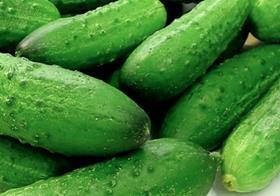
Last update: 08:00 CEST
Three organic cucumbers from two separate growers in Spain have been identified by officials at the European Commission as the probable source of an outbreak of the bacteria Escherichia coli, which has reportedly caused the death of at least three people in the north of Germany over the past week and affected members of the public in four other European countries.
In a statement late Thursday, the Commission said it had traced three out of four cucumbers, which are suspected of carrying the bacteria, to two farms – one in Almería and one in Málaga.
The source of the fourth suspect cucumber remains unknown, although a further batch traced back to the Netherlands, but traded in Germany, was also reported to be under investigation as German authorities sought to identify 'other potential sources'.
'The suspicion regarding the trigger of the disease is now focused oncucumbers,' commented Germany's health minister Cornelia Prüfer-Storcks.
'Information on the origin and details are now being compiled. These results are a big success for our extensive searchand further investigations will hopefully bring a big step forward,' she added.
Major Strain
Rumours circulated earlier in the week that the source could have potentially originated in any of several products – including cucumbers, peppers, tomatoes and lettuce – prompting grave concern among local and international suppliers of salad vegetables to the market.
In an earlier statement to the European Commission, the German government is understood to have revealed it was investigating all product sources in order to trace the bacterial outbreak back to its original source.
Researchers at the University of Münster hospital, meanwhile, have identified the E.coli strain as HUSEC 41, one of 42 types of E.coli known to have infected members of the German public over the past 15 years.
More than 200 people in Germany are believed to have been affected by food poisoning caused by the latest outbreak, with more than two-thirds of them reported to be women.
Further cases in Sweden, Denmark, the UK and the Netherlands have also been identified, the European Commission revealed.
Shelved
A number of retailers have already taken urgent action since the outbreak.
Reacting to the crisis, discounters Aldi and Lidl are understood to have to removed all four of those products from sale across all of their German stores.
Rewe Group, meanwhile, announced it had taken advice from HU before removing all cucumbers of Spanish origin from its shelves.
German producers, meanwhile, have reacted angrily to a recommendation by the country's Robert Koch Institute that consumers avoid eating vegetables from northern Germany, arguing it will damage their businesses.
Speaking to delegates in the European vegetable business at FRESH2011, the international fresh produce conference and networking event taking place in Rotterdam, Eurofruit Magazine was told that the situation was coming under control.
However, one delegate said fears among German consumers were prompting them 'to continue to pull back' from buying salad vegetables that may be perceived to carry a threat.
Another member of the Dutch trade commented: 'In a country like Germany where food safety is already a major issue, this is going to cause serious damage to consumer confidence and it will take a long time to repair that confidence.'






No comments yet